11-12 September, Aquatic complexities. Tourism, aesthetics and dis:connections
 Workshop at the Käte Hamburger Research Centre global dis:connect, LMU Munich, organised by Hanni Geiger
Workshop at the Käte Hamburger Research Centre global dis:connect, LMU Munich, organised by Hanni Geiger
11-12 September 2024
 Workshop at the Käte Hamburger Research Centre global dis:connect, LMU Munich, organised by Hanni Geiger
Workshop at the Käte Hamburger Research Centre global dis:connect, LMU Munich, organised by Hanni Geiger
11-12 September 2024
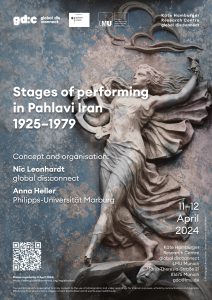 Workshop by Nic Leonhardt (global dis:connect) and Anna Heller (Philipps-Universität Marburg)
Workshop by Nic Leonhardt (global dis:connect) and Anna Heller (Philipps-Universität Marburg)
With the introduction of European drama in the mid-19th century, a new model of theatre emerged in Iran, which in the 20th century developed from a previously amateur activity into an established cultural institution of modern society. In contrast to the processes of social change in Pahlavi Iran (1925–1979), the cultural-historical relevance of the performing arts has not yet been fully explored.
For a holistic approach, this workshop will look at different forms of stage art, including dance, theatre, musical theatre and festivals. The neglect or separate consideration of the musicological aspects of the performing arts reinforces the importance of these forms.
In the context of global theatre histories, understood as the historiography of connections, interweaving, exchanges and dis:connections, the workshop covers a wide range of subtopics. Contributions range from the development of dramatic art and literature in the early Pahlavi era, social criticism and state ideology in the dramatic arts, to opera and stage dance in the late Pahlavi era. The aesthetics of unconventional stages, the theatre of the absurd and the Shiraz Arts Festival are addressed along with biographical approaches to the history of women in theatre.
During the two days of the workshop, we will engage in intensive dialogue on these topics. We will also discuss the increasing methodological obstacles to fieldwork and archival work in the region.
 Workshop at the Käte Hamburger Research Centre global dis:connect, LMU Munich, organised by Andrea Frohne (Fellow Alumna, Käte Hamburger Research Centre and Professor, Ohio University)
Workshop at the Käte Hamburger Research Centre global dis:connect, LMU Munich, organised by Andrea Frohne (Fellow Alumna, Käte Hamburger Research Centre and Professor, Ohio University)
This workshop focuses on free African American people through art, visual culture and studies of space. It investigates circumstances of freedom and the disconnection from slavery prior to the Civil War, representations of free people of colour and descendants in visual culture and studies of space into the 21st century, and 17th and 18th-century White European immigration into Black America.
Presentations may focus on artworks made by free people of colour, such as sculptor Edmonia Lewis, portrait photographer J.P. Ball, landscape artist Robert S. Duncanson, and painters Henry Ossawa Turner and Edward Mitchell Bannister. How did their status as free play a role in their artistic careers or impact the content of their artworks? Papers may also focus on mobility and migration into free Black settlements across the United States and Canada. Topics include visual and spatial analyses of Black churches and schools, ownership of property shown in land surveys, rural roads named after free families of colour, or cemeteries.
With our location in Germany for the workshop, we seek to explore European migration into enslaving territories. What are the through lines of White families who become Black in the new world? They may have become enslavers who bore liberated children of colour. Or they may be indentured servants who bore free children of colour. Some free people of colour in the United States descended from German, British, Irish and Scottish forebears. What are the global ramifications of such disrupted, disconnected genealogies?
Overall, the workshop seeks to contribute new scholarship to the underrecognised subject of free African Americans and descendant populations in visual and spatial representation.
The deadline for presentation proposals is 20 April, 2024.
Please click here for the call for papers.More detailed information on the programme will be provided shortly.
Continue Reading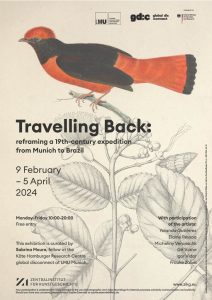 Travelling Back presents a critical perspective on the narratives and collections Bavarian scientists Johann Baptist von Spix (1781–1826) and Carl Friedrich Philipp von Martius (1794–1868) brought from Brazil to Munich in the 19th century. The exhibition follows their extensive three-year journey across the Brazilian hinterland, including the Amazonian region.
Travelling Back presents a critical perspective on the narratives and collections Bavarian scientists Johann Baptist von Spix (1781–1826) and Carl Friedrich Philipp von Martius (1794–1868) brought from Brazil to Munich in the 19th century. The exhibition follows their extensive three-year journey across the Brazilian hinterland, including the Amazonian region.
Spanning 14 000 km, this expedition took place from 1817 to 1820 and was later chronicled in the multi-volume publication Reise in Brasilien (Travels in Brazil – 1823), providing a personal account of the scientists' encounters and perceptions of the country's varied landscapes, cultures and wildlife.
During their travels, Spix and Martius interacted with various indigenous groups and gathered numerous ethnographic, botanical and zoological specimens. These materials became foundational for several Bavarian institutions, like the Bavarian State Collections of Zoology and Botany, as well as the Königlich Ethnographische Sammlung, now the Museum Fünf Kontinente, established in 1862. Beyond tangible artifacts, these collections also treat the history of Isabella Miranha and Johann Juri, two indigenous children brought to Munich in 1820, who died tragically soon after their arrival. Unlike the scientists' evident presence in the city's landscape, the history of these children is marked by silences and absences in public memorial spaces.
The exhibition raises crucial questions about the coloniality underpinning the scientific pursuits of the natural-history project between Munich and Brazil in the 19th century. It examines the various displays and interpretations of Spix and Martius's collections from their arrival in Germany to the present, and it sheds light on the dis:connectivities of knowledge production behind these scientific endeavours. The idea is not only to inquire into the public reception of these experiences through a history of the gaze, but also to draw a critical examination through the lenses of present-day dialogues and initiatives. This includes new scientific practices of knowledge restitution, literary interpretations and contemporary perspectives from artists like Micheliny Verunschk (Brazil), Frauke Zabel (Germany), Yolanda Gutiérrez (Germany/ Mexico), Igor Vidor (Brazil), Elaine Pessoa (Brazil) and Gê Viana (Brazil).
Curator: Sabrina Moura, fellow at Käte Hamburger Research Centre global dis:connect Continue Reading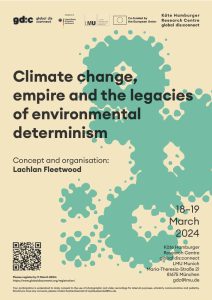 We live in a time when concern about human effects on the environment and climate are greater than ever. For much of human history, however, the opposite was true, and environments’ and climates’ effects on people were often the more pressing concern. Environmental or climatic determinism – the idea that people are shaped physically, culturally and even morally – by their environments has a long and often insidious history.
We live in a time when concern about human effects on the environment and climate are greater than ever. For much of human history, however, the opposite was true, and environments’ and climates’ effects on people were often the more pressing concern. Environmental or climatic determinism – the idea that people are shaped physically, culturally and even morally – by their environments has a long and often insidious history.
Determinist thinking had particular utility in the age of European and global empires in the 19th and 20th centuries, taking on new forms amidst attempts to expand and justify imperial dominance. Everything from ‘energy’ to racial characteristics and from ‘civilisational success’ to the limits of habitability were seen as environmentally and climatically determined. Today, these ideas are once again being reconfigured in new and troubling ways, such as in the deterministic language sometimes employed around climate and migration, which risks echoing racist, early 20th-century visions of ‘nomadic hordes’. With the Anthropocene concept placing human and planetary histories and futures on the same scale, tracing the language of environmental determinism has become imperative.
This two-day workshop, hosted by the Käte Hamburger Research Centre global dis:connect at the LMU Munich, will thus contextualise environmentally determinist ideas historically and examine their imperial legacies in the face of today’s climate crisis.Place & date: Munich, 18-19 March2024
Organiser: Lachlan Fleetwood (LMU Munich)
Venue: Käte Hamburger Research Centre global dis:connect, Maria-Theresia-Straße 21, 81675 Munich
Please click here to download the programme. global dis:connect summer school 2024
global dis:connect summer school 2024
On 22 and 23 Feb. 2024, the Center will hold an international workshop focusing on the topic of "archival f(r)ictions" in curatorial and artistic film practice.
The workshop invites in a transdisciplinary dialogue on the colonial legacies of film archives. By making use of invention, imagination and speculation, artists and curators have explored the possibilities of engaging critically with the historical narratives contained in the archive, appropriating and transforming them. In this context, fiction has frequently served as a means to interrogate official histories and the legacies of the colonial past. In works by John Akomfrah, Filipa César, Tamika Galanis, Payal Kapadia, Zineb Sedira, Fiona Tan, Ala Younis, Akram Zaatari – to name just a few – the archive has become a site of subversive fiction and artistic resistance. In the framework of “global dis:connect”, the workshop addresses the potential of dis:connections, of the counterhegemonic f(r)ictions produced by imagining other (hi)stories from which alternative memories and futures may emerge. The focus lies on artistic and curatorial practices that produce dissonances and allochronisms through fictional narratives that investigate and rework the histories contained and preserved in archives.
Place & date: Munich, 22-23 February 2024
Organisers: Fabienne Liptay (University of Zurich), Laura McMahon (University of Cambridge), Sujit Sivasundaram (University of Cambridge)
Venue: Käte Hamburger Research Centre global dis:connect, Maria-Theresia-Straße 21, 81675 Munich
Continue Reading Travelling Back presents a critical perspective on the narratives and collections Bavarian scientists Johann Baptist von Spix (1781–1826) and Carl Friedrich Philipp von Martius (1794–1868) brought from Brazil to Munich in the 19th century. The exhibition follows their extensive three-year journey across the Brazilian hinterland, including the Amazonian region.
Travelling Back presents a critical perspective on the narratives and collections Bavarian scientists Johann Baptist von Spix (1781–1826) and Carl Friedrich Philipp von Martius (1794–1868) brought from Brazil to Munich in the 19th century. The exhibition follows their extensive three-year journey across the Brazilian hinterland, including the Amazonian region.
Spanning 14 000 km, this expedition took place from 1817 to 1820 and was later chronicled in the multi-volume publication Reise in Brasilien (Travels in Brazil – 1823), providing a personal account of the scientists' encounters and perceptions of the country's varied landscapes, cultures and wildlife.
During their travels, Spix and Martius interacted with various indigenous groups and gathered numerous ethnographic, botanical and zoological specimens. These materials became foundational for several Bavarian institutions, like the Bavarian State Collections of Zoology and Botany, as well as the Königlich Ethnographische Sammlung, now the Museum Fünf Kontinente, established in 1862. Beyond tangible artifacts, these collections also treat the history of Isabella Miranha and Johann Juri, two indigenous children brought to Munich in 1820, who died tragically soon after their arrival. Unlike the scientists' evident presence in the city's landscape, the history of these children is marked by silences and absences in public memorial spaces.
The exhibition raises crucial questions about the coloniality underpinning the scientific pursuits of the natural-history project between Munich and Brazil in the 19th century. It examines the various displays and interpretations of Spix and Martius's collections from their arrival in Germany to the present, and it sheds light on the dis:connectivities of knowledge production behind these scientific endeavours. The idea is not only to inquire into the public reception of these experiences through a history of the gaze, but also to draw a critical examination through the lenses of present-day dialogues and initiatives. This includes new scientific practices of knowledge restitution, literary interpretations and contemporary perspectives from artists like Micheliny Verunschk (Brazil), Frauke Zabel (Germany), Yolanda Gutiérrez (Germany/ Mexico), Igor Vidor (Brazil), Elaine Pessoa (Brazil) and Gê Viana (Brazil).
Curator: Sabrina Moura, fellow at Käte Hamburger Research Centre global dis:connect Please click here to download the programme of the opening conference. Continue Reading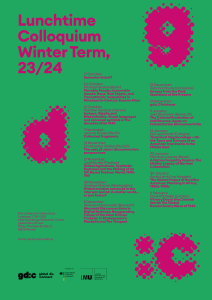
The lunchtime colloquium (“ltc”) of the gd:c continues in the winter term. The first session will take place on 24 October. The colloquium takes place on Tuesdays from 11.30 am to 1 pm at the library of the Research Centre.
You can download the programme of the lunchtime colloquium here
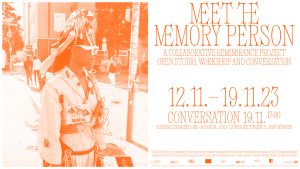
Meet The Memory Person - a collaborative remembrance project: open studio, workshop and conversation (Venue: FLORIDA Lothringer 13 81667 München, Ein Kunstraum der Stadt München)
Artistic concept: Franziska Windolf
Curation: Mareike Schwarz
Munich’s Florida organisation will host Meet the Memory Person, a gathering to develop and envision the future of the collaborative and performative monument, initiated in Giesing in 2023 and dedicated to artists of all kinds who are living in exile or have migrate(d) to/from Munich, in particular Giesing. Workshop: Sunday, 12.11.2023, 11am-3pm The event starts with a workshop featuring creative guests from Giesing who have a connection to migration and exile and have encountered the Memory Person during their public performances. Open studio: to further extend collaboration on the monument, everyone is welcome to register for the 'Open Studio' from Monday, 13.11.23 - Saturday, 18.11.23. Materials and tools are available, and the artist will be present and looking forward to conversation and creativity. Contact franzi.windolf@posteo.de. Conversation: Sunday, 19.11.23, 5pm With Burcu Dogramaci, Laura Bruns, Cathrine Bublatzky, Clara Laila Abid Alsstar and Franziska Windolf. This event will also launch the Meet The Memory Person catalogue, with drinks and snacks!